人教版高中英语选修八Unit5 Meeting your ancestors period 4 Grammar课件(37张PPT)
文档属性
| 名称 | 人教版高中英语选修八Unit5 Meeting your ancestors period 4 Grammar课件(37张PPT) | 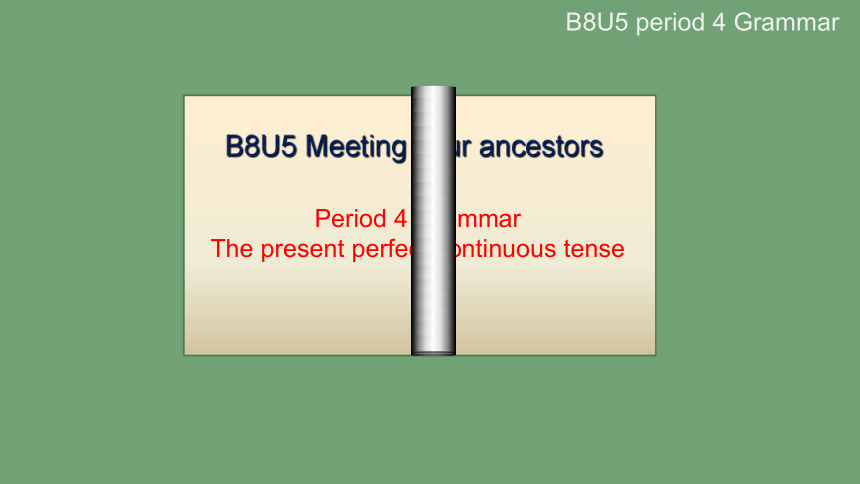 | |
| 格式 | zip | ||
| 文件大小 | 1.6MB | ||
| 资源类型 | 教案 | ||
| 版本资源 | 人教版(新课程标准) | ||
| 科目 | 英语 | ||
| 更新时间 | 2020-07-06 09:42:05 | ||
图片预览

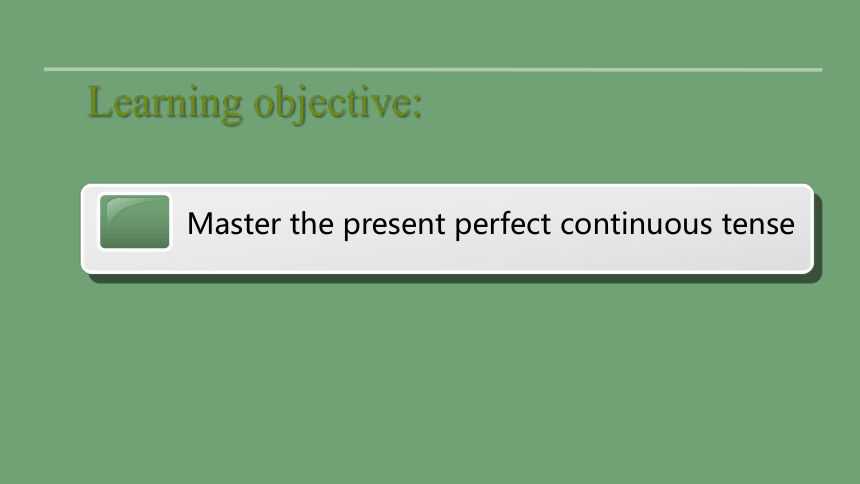
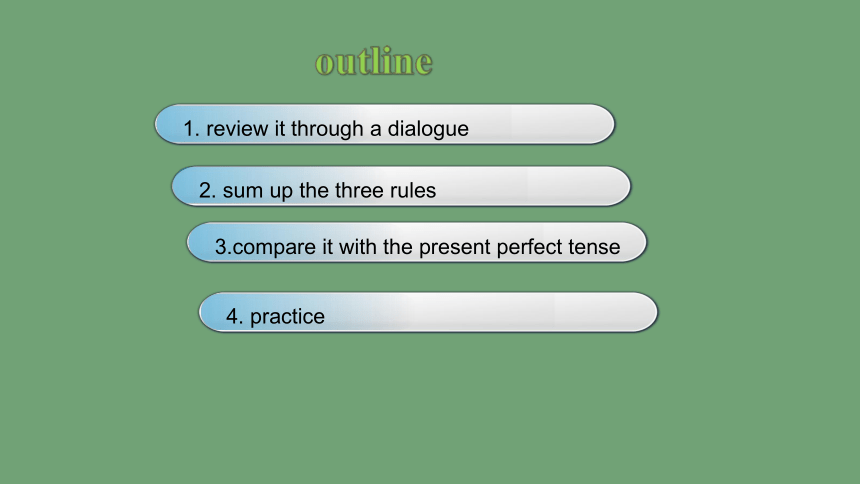
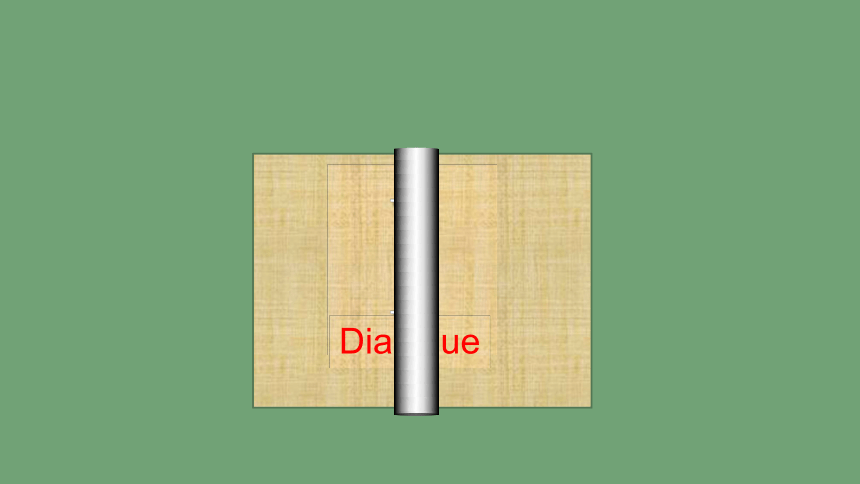

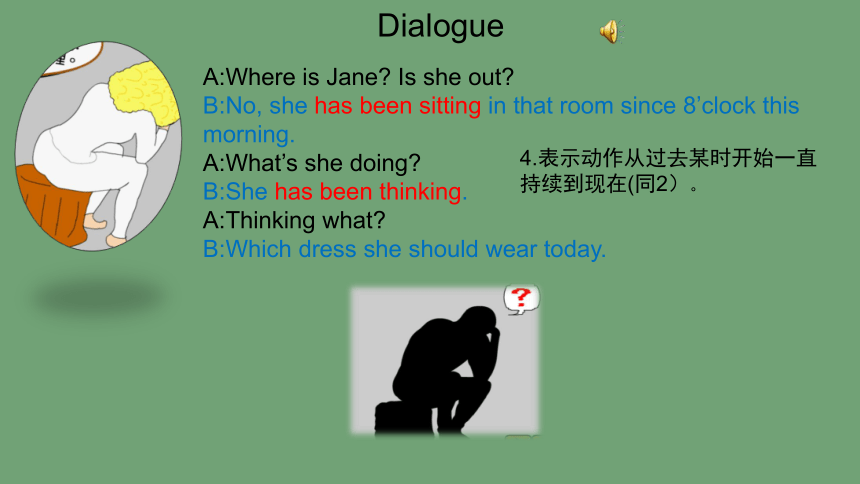

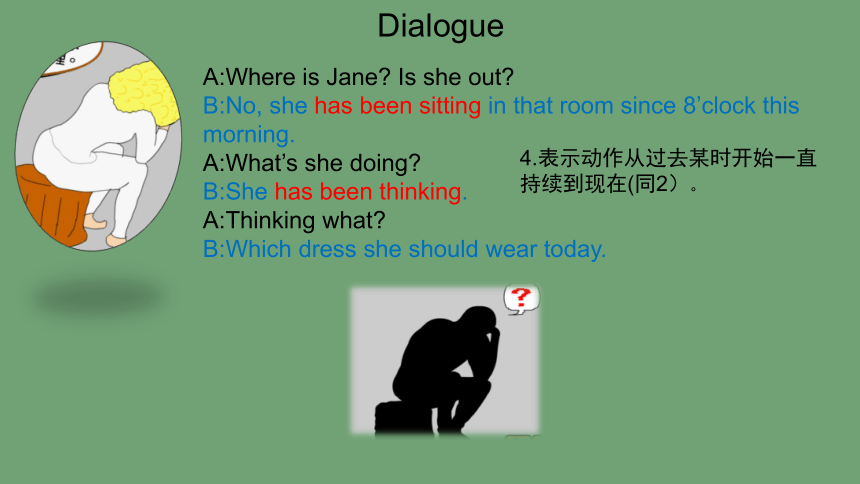
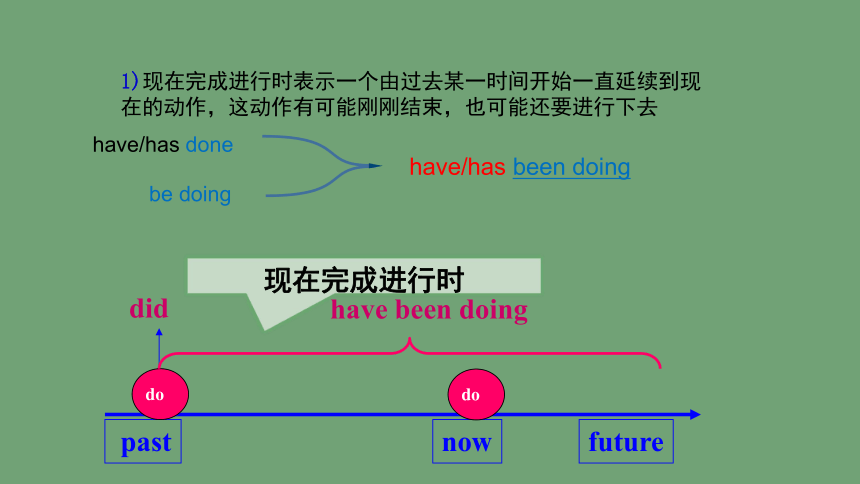
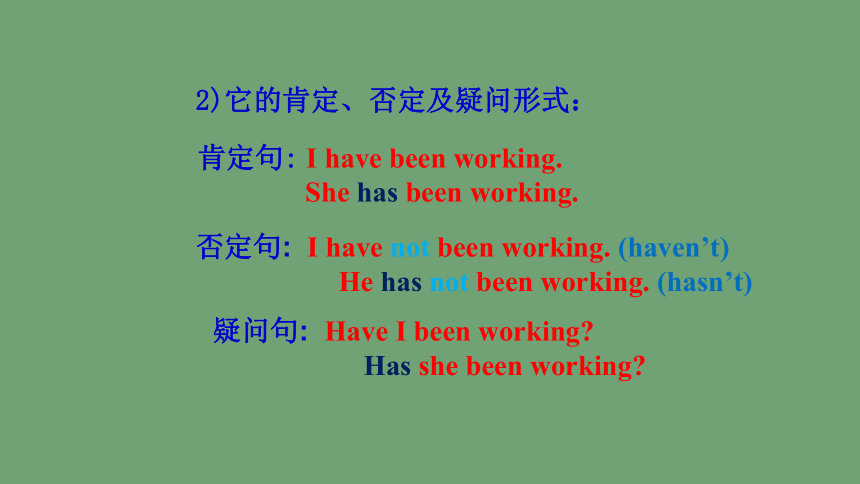
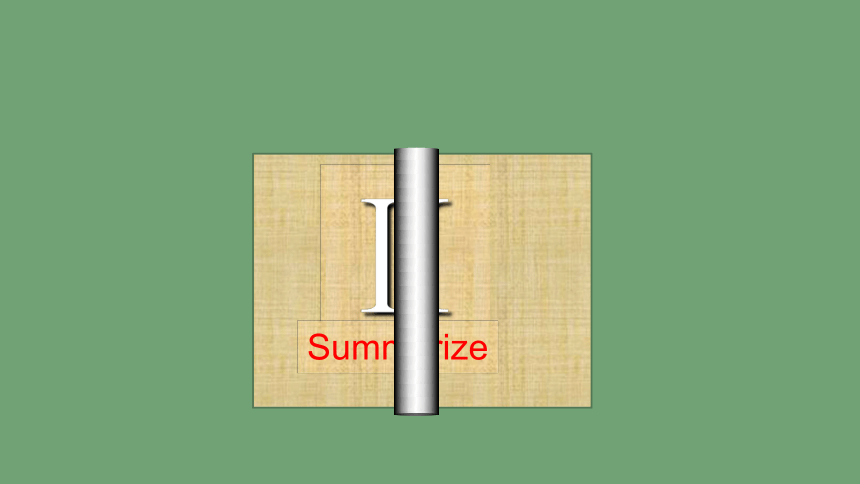
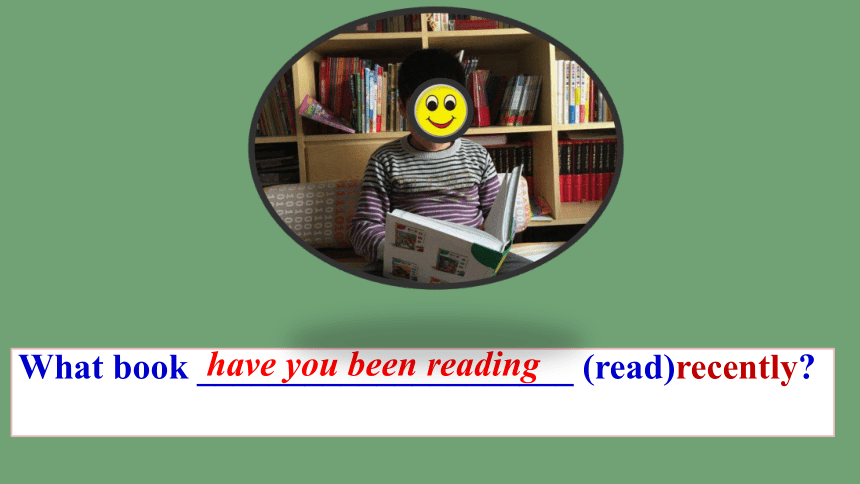
文档简介
(共37张PPT)
B8U5
Meeting
your
ancestors
Period
4
Grammar
The
present
perfect
continuous
tense
B8U5
period
4
Grammar
Master
the
present
perfect
continuous
tense
Learning
objective:
outline
1.
review
it
through
a
dialogue
2.
sum
up
the
three
rules
3.compare
it
with
the
present
perfect
tense
4.
practice
Ⅰ
Dialogue
A:Hi,
Peter,
I
haven’t
seen
you
for
months.
What
have
you
been
doing
lately?
B:Studying.
A:Studying
what?
B:Japanese.
A:Oh?
Really?
But
I
have
never
heard
you
practising
it.
B:I
have
been
studying
Japanese
for
five
years.
A:That’s
great!
Then
you
can
be
my
interpreter
when
I
go
to
Japan.
B:No
problem!
A:Oh!
I
almost
forgot!
I
have
a
gift
for
you!
B:Thank
you
so
much
for
this
nice
walkman.
I’ve
been
wanting
it
for
a
long
time.
3.表示从过去某时开始持续到现在,但不再继续下去的事情。
Dialogue
1.表示“最近”一直在从事的工作或活动。
2.表示动作从过去某时开始一直持续到现在,并可能仍在继续的事情。
A:Where
is
Jane?
Is
she
out?
B:No,
she
has
been
sitting
in
that
room
since
8’clock
this
morning.
A:What’s
she
doing?
B:She
has
been
thinking.
A:Thinking
what?
B:Which
dress
she
should
wear
today.
4.表示动作从过去某时开始一直持续到现在(同2)。
Dialogue
A:Hi,
Peter,
I
haven’t
seen
you
for
months.
What
have
you
been
doing
lately?
B:Studying.
A:Studying
what?
B:Japanese.
A:Oh?
Really?
But
I
have
never
heard
you
practising
it.
B:I
have
been
studying
Japanese
for
five
years.
A:That’s
great!
Then
you
can
be
my
interpreter
when
I
go
to
Japan.
B:No
problem!
A:Oh!
I
almost
forgot!
I
have
a
gift
for
you!
B:Thank
you
so
much
for
this
nice
walkman.
I’ve
been
wanting
it
for
a
long
time.
3.表示从过去某时开始持续到现在,但不再继续下去的事情。
Dialogue
1.表示“最近”一直在从事的工作或活动。
2.表示动作从过去某时开始一直持续到现在,并可能仍在继续的事情。
A:Where
is
Jane?
Is
she
out?
B:No,
she
has
been
sitting
in
that
room
since
8’clock
this
morning.
A:What’s
she
doing?
B:She
has
been
thinking.
A:Thinking
what?
B:Which
dress
she
should
wear
today.
4.表示动作从过去某时开始一直持续到现在(同2)。
Dialogue
past
future
now
did
do
have
been
doing
do
现在完成进行时
现在完成进行时
1)现在完成进行时表示一个由过去某一时间开始一直延续到现在的动作,这动作有可能刚刚结束,也可能还要进行下去
have/has
done
be
doing
have/has
been
doing
2)它的肯定、否定及疑问形式:
肯定句:
I
have
been
working.
She
has
been
working.
否定句:
I
have
not
been
working.
(haven’t)
He
has
not
been
working.
(hasn’t)
现在完成进行时
疑问句:
Have
I
been
working?
Has
she
been
working?
Ⅱ
Summarize
What
book
_____________________
(read)recently?
have
you
been
reading
I
_____________________
(feel)
rather
tired
lately
and
I______________________(sleep)
very
well.
have
been
feeling
haven’t
been
sleeping
The
usage
1
叙述“最近”一直从事的工作或活动。--lately,
recently
rained
yesterday
future
now
rain
rain
It
________
___________
___________________(rain)_
since
yesterday
and
it
is
still
raining.
has
been
raining
We
___________________
(study)on
the
Internet
since
mid-February.
have
been
studying
To
isolate
the
2019-ncov,
some
people_________________
(stay)at
the
hotel
already
for
a
week.
have
been
staying
The
usage
2
叙述某一动作从过去开始一直继续到现在仍在继续之中,可能还要继续下去的动作。
经常与“for+段时间”或“since+点时间"的时间状语连用.
Oh,
you
have
come
at
last!
I
__________________
(wait
for)you
for
two
hours!
咋还不来...
have
been
waiting
for
You
are
here!
I
________________
(look
for)you
all
the
day!
have
been
looking
for
Mom
_____________
(do)housework
all
day.
has
been
doing
The
usage
3
叙述从过去某时开始一直继续到现在,但不再继续下去的事情。带有浓厚的感彩,强调持续了“那么久”或做得“那么辛苦”。
Ⅲ
Compare
Compare:
现在完成进行时&现在完成时
past
future
now
did
do
have
done
past
future
now
did
do
have
been
doing
do
现在完成时
现在完成进行时
Who
has
eaten
my
dinner?
Who
has
been
eating
my
dinner?
(已吃光)
(一直在吃,还有剩下的)
1.现在完成时着重结果;
现在完成进行时强调动作的
持续性,暂时性和未完成性。
Recently
Jack
has
been
doing
his
work
regularly.
Recently
Jack
has
done
his
work
regularly.
(陈述事实)
(赞许)
2.现在完成进行时含有明显的感彩,
现在完成时往往只说明一个事实,一种影响或结果,没有感彩。
Ⅳ
Practice
用所给词的适当形式填空
1.I
(teach)
for
more
than
13
years.
?
2.I
won’t
tell
the
student
the
answer
to
the
maths
problem
until
he
(work)
on
it
for
more
than
an
hour.
?
3.Cathy
is
taking
notes
of
the
grammatical
rules
in
class
at
Sunshine
School,
where
she
(study)
English
for
a
year.
?
4.—I
have
got
a
headache.
—No
wonder.
You
(work)
in
front
of
that
computer
too
long.
?
have
been
teaching
has
been
working
has
been
studying
have
been
working
Exercises
?
单句改错
1.All
these
years
they
are
contributing
articles
to
our
magazine.
2.
I
have
been
drinking
five
cups
of
coffee
this
afternoon.
3.
What
have
you
been
doing
before
you
left
Oxford?
have
been
drunk
had
before
left
now
past
did
had
been
doing
had
been
doing
1.我已经修好了洗衣机。
2.我一直在修洗衣机。
3.学生们已经为考试做了准备。
4.学生们一直在准备考试。
Translation
5.我等开学都已经等了三个月了。
6.我们已经看了很长时间的电视了。
1.我已经修好了洗衣机。
I
have
repaired
the
washing
machine.
2.我一直在修洗衣机。
I
have
been
repairing
the
washing
machine.
Translation
3.学生们已经为考试做了准备。
4.学生们一直在准备考试。
The
students
have
prepared
for
the
exam.
The
students
?have
been
preparing?for
the
exam.
5.我等开学都已经等了三个月了。
6.我们已经看了很长时间的电视了。
I
have
been
expecting
to
back
to
school
for
three
months.
We
have
been
watching
television
for
a
long
time.
Way
Back
Into
Love
I've
been
living
with
a
shadow
overhead
I've
been
sleeping
with
a
cloud
above
my
bed
I've
been
lonely
for
so
long
Trapped
in
the
past,
I
just
can't
seem
to
move
on
I've
been
hiding
all
my
hopes
and
dreams
away
Just
in
case
I
ever
need
them
again
someday
I've
been
setting
aside
time
To
clear
a
little
space
in
the
corners
of
my
mind
All
I
wanna
do
is
find
a
way
back
into
love
I
can't
make
it
through
without
a
way
back
into
love
I've
been
watching
but
the
stars
refuse
to
shine
I've
been
searching
but
I
just
don't
see
the
signs
I
know
that
it's
out
there
There's
gonna
be
something
for
my
soul
somewhere
I've
been
looking
for
someone
to
shed
some
light
Enjoy
a
music
1.
Finish
Ex.
1
and
2
on
pages
80
Homework
Thank
you
for
your
attention!
B8U5
Meeting
your
ancestors
Period
4
Grammar
The
present
perfect
continuous
tense
B8U5
period
4
Grammar
Master
the
present
perfect
continuous
tense
Learning
objective:
outline
1.
review
it
through
a
dialogue
2.
sum
up
the
three
rules
3.compare
it
with
the
present
perfect
tense
4.
practice
Ⅰ
Dialogue
A:Hi,
Peter,
I
haven’t
seen
you
for
months.
What
have
you
been
doing
lately?
B:Studying.
A:Studying
what?
B:Japanese.
A:Oh?
Really?
But
I
have
never
heard
you
practising
it.
B:I
have
been
studying
Japanese
for
five
years.
A:That’s
great!
Then
you
can
be
my
interpreter
when
I
go
to
Japan.
B:No
problem!
A:Oh!
I
almost
forgot!
I
have
a
gift
for
you!
B:Thank
you
so
much
for
this
nice
walkman.
I’ve
been
wanting
it
for
a
long
time.
3.表示从过去某时开始持续到现在,但不再继续下去的事情。
Dialogue
1.表示“最近”一直在从事的工作或活动。
2.表示动作从过去某时开始一直持续到现在,并可能仍在继续的事情。
A:Where
is
Jane?
Is
she
out?
B:No,
she
has
been
sitting
in
that
room
since
8’clock
this
morning.
A:What’s
she
doing?
B:She
has
been
thinking.
A:Thinking
what?
B:Which
dress
she
should
wear
today.
4.表示动作从过去某时开始一直持续到现在(同2)。
Dialogue
A:Hi,
Peter,
I
haven’t
seen
you
for
months.
What
have
you
been
doing
lately?
B:Studying.
A:Studying
what?
B:Japanese.
A:Oh?
Really?
But
I
have
never
heard
you
practising
it.
B:I
have
been
studying
Japanese
for
five
years.
A:That’s
great!
Then
you
can
be
my
interpreter
when
I
go
to
Japan.
B:No
problem!
A:Oh!
I
almost
forgot!
I
have
a
gift
for
you!
B:Thank
you
so
much
for
this
nice
walkman.
I’ve
been
wanting
it
for
a
long
time.
3.表示从过去某时开始持续到现在,但不再继续下去的事情。
Dialogue
1.表示“最近”一直在从事的工作或活动。
2.表示动作从过去某时开始一直持续到现在,并可能仍在继续的事情。
A:Where
is
Jane?
Is
she
out?
B:No,
she
has
been
sitting
in
that
room
since
8’clock
this
morning.
A:What’s
she
doing?
B:She
has
been
thinking.
A:Thinking
what?
B:Which
dress
she
should
wear
today.
4.表示动作从过去某时开始一直持续到现在(同2)。
Dialogue
past
future
now
did
do
have
been
doing
do
现在完成进行时
现在完成进行时
1)现在完成进行时表示一个由过去某一时间开始一直延续到现在的动作,这动作有可能刚刚结束,也可能还要进行下去
have/has
done
be
doing
have/has
been
doing
2)它的肯定、否定及疑问形式:
肯定句:
I
have
been
working.
She
has
been
working.
否定句:
I
have
not
been
working.
(haven’t)
He
has
not
been
working.
(hasn’t)
现在完成进行时
疑问句:
Have
I
been
working?
Has
she
been
working?
Ⅱ
Summarize
What
book
_____________________
(read)recently?
have
you
been
reading
I
_____________________
(feel)
rather
tired
lately
and
I______________________(sleep)
very
well.
have
been
feeling
haven’t
been
sleeping
The
usage
1
叙述“最近”一直从事的工作或活动。--lately,
recently
rained
yesterday
future
now
rain
rain
It
________
___________
___________________(rain)_
since
yesterday
and
it
is
still
raining.
has
been
raining
We
___________________
(study)on
the
Internet
since
mid-February.
have
been
studying
To
isolate
the
2019-ncov,
some
people_________________
(stay)at
the
hotel
already
for
a
week.
have
been
staying
The
usage
2
叙述某一动作从过去开始一直继续到现在仍在继续之中,可能还要继续下去的动作。
经常与“for+段时间”或“since+点时间"的时间状语连用.
Oh,
you
have
come
at
last!
I
__________________
(wait
for)you
for
two
hours!
咋还不来...
have
been
waiting
for
You
are
here!
I
________________
(look
for)you
all
the
day!
have
been
looking
for
Mom
_____________
(do)housework
all
day.
has
been
doing
The
usage
3
叙述从过去某时开始一直继续到现在,但不再继续下去的事情。带有浓厚的感彩,强调持续了“那么久”或做得“那么辛苦”。
Ⅲ
Compare
Compare:
现在完成进行时&现在完成时
past
future
now
did
do
have
done
past
future
now
did
do
have
been
doing
do
现在完成时
现在完成进行时
Who
has
eaten
my
dinner?
Who
has
been
eating
my
dinner?
(已吃光)
(一直在吃,还有剩下的)
1.现在完成时着重结果;
现在完成进行时强调动作的
持续性,暂时性和未完成性。
Recently
Jack
has
been
doing
his
work
regularly.
Recently
Jack
has
done
his
work
regularly.
(陈述事实)
(赞许)
2.现在完成进行时含有明显的感彩,
现在完成时往往只说明一个事实,一种影响或结果,没有感彩。
Ⅳ
Practice
用所给词的适当形式填空
1.I
(teach)
for
more
than
13
years.
?
2.I
won’t
tell
the
student
the
answer
to
the
maths
problem
until
he
(work)
on
it
for
more
than
an
hour.
?
3.Cathy
is
taking
notes
of
the
grammatical
rules
in
class
at
Sunshine
School,
where
she
(study)
English
for
a
year.
?
4.—I
have
got
a
headache.
—No
wonder.
You
(work)
in
front
of
that
computer
too
long.
?
have
been
teaching
has
been
working
has
been
studying
have
been
working
Exercises
?
单句改错
1.All
these
years
they
are
contributing
articles
to
our
magazine.
2.
I
have
been
drinking
five
cups
of
coffee
this
afternoon.
3.
What
have
you
been
doing
before
you
left
Oxford?
have
been
drunk
had
before
left
now
past
did
had
been
doing
had
been
doing
1.我已经修好了洗衣机。
2.我一直在修洗衣机。
3.学生们已经为考试做了准备。
4.学生们一直在准备考试。
Translation
5.我等开学都已经等了三个月了。
6.我们已经看了很长时间的电视了。
1.我已经修好了洗衣机。
I
have
repaired
the
washing
machine.
2.我一直在修洗衣机。
I
have
been
repairing
the
washing
machine.
Translation
3.学生们已经为考试做了准备。
4.学生们一直在准备考试。
The
students
have
prepared
for
the
exam.
The
students
?have
been
preparing?for
the
exam.
5.我等开学都已经等了三个月了。
6.我们已经看了很长时间的电视了。
I
have
been
expecting
to
back
to
school
for
three
months.
We
have
been
watching
television
for
a
long
time.
Way
Back
Into
Love
I've
been
living
with
a
shadow
overhead
I've
been
sleeping
with
a
cloud
above
my
bed
I've
been
lonely
for
so
long
Trapped
in
the
past,
I
just
can't
seem
to
move
on
I've
been
hiding
all
my
hopes
and
dreams
away
Just
in
case
I
ever
need
them
again
someday
I've
been
setting
aside
time
To
clear
a
little
space
in
the
corners
of
my
mind
All
I
wanna
do
is
find
a
way
back
into
love
I
can't
make
it
through
without
a
way
back
into
love
I've
been
watching
but
the
stars
refuse
to
shine
I've
been
searching
but
I
just
don't
see
the
signs
I
know
that
it's
out
there
There's
gonna
be
something
for
my
soul
somewhere
I've
been
looking
for
someone
to
shed
some
light
Enjoy
a
music
1.
Finish
Ex.
1
and
2
on
pages
80
Homework
Thank
you
for
your
attention!
